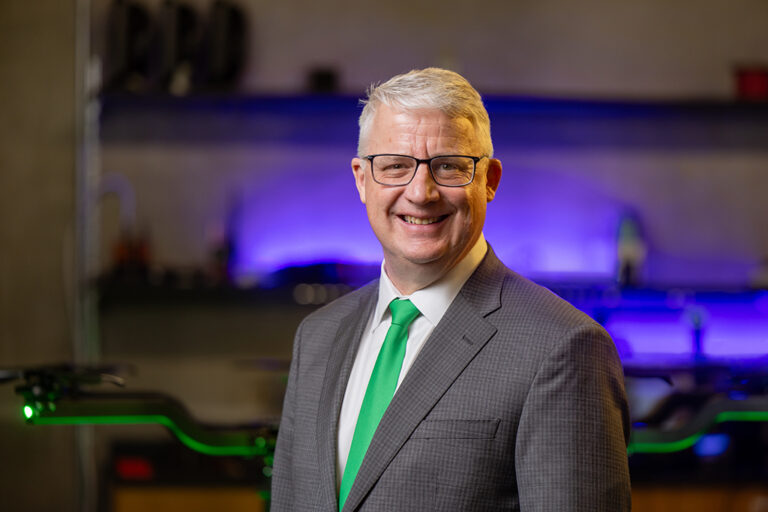UND to lead regional NSF Engines Development partnership
Grant will drive autonomous systems research, boost opportunities across multistate region

Along with five other regional universities, UND has been awarded nearly $1 million from the U.S. National Science Foundation’s Regional Innovation Engines (NSF Engines) program.
UND leads one of the 44 teams nationwide in receiving one of the first-ever NSF Engines Development Awards, which aims to help partners collaborate to create economic, societal and technological opportunities for their regions.
UND and its partners from across four states in the region will work to build a framework (the “engine”) that catalyzes autonomous system development and fielding, enabling the accelerated realization of economic and humanitarian benefits from autonomous systems technology across a wide range of use cases.
The grant announcement drew praise of North Dakota’s expanding presence in autonomous systems from Sen. Kevin Cramer, R-N.D.
“Congratulations to UND for receiving this monumental award,” said Cramer. “This is another feather in the cap of our state’s growing leadership in autonomous systems. Partnering with northern states and the Tribal Nations Research Group is an incredible opportunity to show off North Dakota’s excellence in science and technology.”
UND President Andrew Armacost said he is grateful to the state’s congressional delegation for their support to establish a Regional Innovation Engine. He said he is looking forward to growing cross-institutional and cross-sector collaborations, from partnerships with tribal colleges, NDSU, the NDUS system, and the universities across the other states in the region, to partnering with government entities and industry.
“This award is an excellent opportunity to bring together leaders in autonomous systems,” Armacost said. “Now we can begin working to include entrepreneurs, other academic institutions and industry, in making use of autonomous systems, with the unified goal of achieving global competitiveness. UND truly excels at autonomous systems research and applications, and the state of North Dakota has invested deeply in diversifying its economy through this technology. This project will strengthen connections within the state, expand participation in technological and workforce development, and directly connect resources and capacities across state lines to accelerate the economic benefits.”
“I am grateful to the National Science Foundation for this award funding, and to our congressional delegation for their continuing support,” Armacost said. “I offer my thanks to all those who worked on this project.”
The grant will also focus on driving workforce development initiatives to cultivate needed skills, including engaging all stakeholders and expanding participation of underrepresented groups—especially from native populations that are critical stakeholders across the region.
“This region has a unique set of capabilities for building autonomous systems technology, including established test beds, targeted state and regional support, and strong industry engagement that gives the region a competitive edge,” said John Mihelich, vice president for research & economic development. “We, collectively, are prepared to lead a distributed and highly-connected technology engine which will enable a rural, low-population region to systemically contribute to national technological innovation and economic diversity.”
The team of universities plans to add more partners, stakeholders, and end-users to build a strong foundation that diversifies the regional economic base. Growing the autonomous systems industry in the region will help develop and integrate technology in transportation, precision agriculture, energy, health care, mining and national security. Partnerships between universities, industry, the private sector and state, local and tribal governments, will direct the research, development and commercialization of autonomous systems technology across diverse fields.
“We are truly thankful for the opportunity provided by the National Science Foundation to work with an amazing set of partners to drive autonomous systems development and expand efforts to grow a diverse and skilled workforce,” said Mark Askelson, associate vice president for national security at UND and principal investigator of the project. “We are the beneficiaries of a lot of hard work by many, including leadership at the federal, state, and local levels, industry, innovators, researchers and economic developers, all of whom laid the foundation for this opportunity.”
UND will focus on uncrewed aircraft, transportation, energy, national security, and rural health initiatives. The other regional partners in the grant, as well as their focus areas, are: Tribal Nations Research Group (Turtle Mountain Band of Chippewa Indians), data protection, mining, management, and tribal partner outreach; Montana State University, smart optical sensors; Montana State University MilTech, technology transition from research to commercialization; South Dakota Mines, mining and autonomous mining equipment, and Boise State University, resource management and energy.
The NSF Engines program is a transformational investment for the nation, ensuring the U.S. remains in the vanguard of competitiveness for decades to come.
“These NSF Engines Development Awards lay the foundation for emerging hubs of innovation and potential future NSF Engines,” said NSF Director Sethuraman Panchanathan. “These awardees are part of the fabric of NSF’s vision to create opportunities everywhere and enable innovation anywhere. They will build robust regional partnerships rooted in scientific and technological innovation in every part of our nation. Through these planning awards, NSF is seeding the future for in-place innovation in communities and to grow their regional economies through research and partnerships. This will unleash ideas, talent, pathways and resources to create vibrant innovation ecosystems all across our nation.”
The 44 awardees of the grants span a broad range of states and regions, reaching geographic areas that have not fully benefited from the technology boom of the past decades. These NSF Engines awards will help organizations create connections and develop their local innovation ecosystems within two years to prepare strong proposals for becoming future NSF Engines, which will each have the opportunity to receive up to $160 million.
The awards were launched by the NSF’s new Directorate for Technology, Innovation and Partnerships, and were and authorized by the “CHIPS and Science Act of 2022.” The NSF Engines program uniquely harnesses the nation’s science and technology research and development enterprise and regional-level resources. NSF Engines aspire to catalyze robust partnerships to positively impact regional economies, accelerate technology development, address societal challenges, advance national competitiveness and create local, high-wage jobs.



